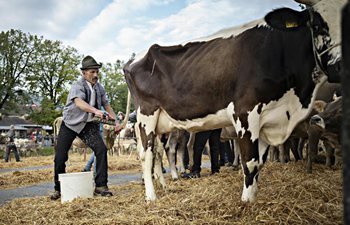by Xinhua writer Luan Xiang
BEIJING, Oct. 4 (Xinhua) -- China has been making crucial progress in educating the public about rabies prevention, as the country becomes more aware of pet owner responsibilities and works to create a harmonious coexistence between humans and their furry companions.
To mark the 12th World Rabies Day on Sept. 28, various institutions, charitable organizations, scholars and activists came together to promote a civil code of conduct among the growing number of pet owners across the country, while acknowledging societal efforts made to care for stray animals.
China has established goals to complete a nationwide dog vaccination registration program and to raise the percentage of vaccinated to at least 70 percent of the total dog population by 2020, according to a national action plan issued by the Ministry of Agriculture in 2017.
With proper tools, China is hopeful about achieving the rabies-free goal within our lifetime, said Qin Xiaona, president of the Beijing-based Capital Animal Welfare Association and a senior advisor to the China Medical Foundation.
ELIMINATING MYTHS AND FEARS
The most efficient way to wipe out rabies risks is to properly immunize China's canines on a large scale, which would require their guardians to assume their responsibilities and to not abandon or neglect any animal family members, said Sun Quanhui, a vet and science officer with World Animal Protection's Beijing Office.
Studies published by the World Health Organization (WHO) show that, if 70 percent or above of a certain location's dog population is vaccinated, an immunological barrier is formed that impedes the virus from spreading, meaning the disease is easily contained.
According to research conducted by WHO in collaboration with the UN Food and Agriculture Organization (FAO) and World Organization for Animal Health, nationwide dog vaccination campaigns are the most cost-effective strategy for preventing rabies, while the social-cultural context influences perceptions of the disease, of dog keeping practices and of at-risk canine populations, areas where the general public plays a key part.
This means that as long as people assume their responsibilities, take their dogs to be immunized and make sure that the vaccine stays active, it will be far less possible for house pets or rural working dogs to be infected with the virus, Qin said. "Under proper management, rabies is 100 percent preventable."
On his part, Sun emphasized that to efficiently manage dog populations from the very source means to stringently restrict and supervise the commercial breeding and sales of companion animals, as well as to widen stray control programs such as TNR (a 3-step method of trap, neuter and return) or to encourage the public to adopt stray animals rescued from negligence, abandonment or abuse instead of letting them continue wandering the streets.
Members of the public who are pet owners should play a crucial role in rabies prevention alongside the functional departments of the government including those related to human public health, animal health, urban management, public security and others, he told Xinhua.
There is no need to panic over a scratch from a vaccinated, risk-free pet during play time, and through campaigns and education, people have been gradually overcoming the exaggerated fear that all dogs are potentially infected with the disease, which became "a myth or a horror story", said Caitlin Cecil, an American animal behaviorist who has been saving distressed, abandoned animals and finding them new homes in China.
Pet owners are being urged not to abandon their unvaccinated animal pals that are at risk of contracting and carrying the lethal virus.
While abandonment, abuse and negligence of a domestic animal are punishable by law in many parts of the world, China's lawmakers are said to still be deliberating over enacting regulations against cruelty to companion animals.
"Abandonment and abuse of animals are unethical acts that ought to be condemned by the whole society," stressed Wang Chaoying, deputy director of the legal affairs office of the Standing Committee of the National People's Assembly -- China's highest legislature -- at a press conference earlier this year.
He said it is better to take time to establish legal codes in a comprehensive, prudent manner.
CHANGING THE MENTALITY
China has been making heavy investment in preventing and treating rabies, and the reason for heavy investment is simple -- vaccines for dogs are much cheaper than the medical costs of trying to save an infected human patient, and such an attempt ends in vain most of the time, according to Zhang Yue, a talk show hostess specialized in social issues.
Taking a dog to the vet for a rabies vaccine costs less than 100 yuan (14.50 U.S. dollars), while treatment for humans costs a few hundred yuan depending on medical quality and origin, Zhang said.
And when a person is confirmed infected with the virus after showing symptoms, the treatment skyrockets to tens of thousands of yuan with the vast majority of patients ending up dead, she told Xinhua in an interview.
Zhang is also the co-founder of non-profit organization, the AITA Foundation, which aids animal rescues, promotes respect for animal life, compassion and civility, and provides medical treatment to animals.
It is more efficient to prevent a disease from happening than treating it after it has spread. When it comes to rabies, a crucial line is drawn between life and death, and there should be more advocating for the adoption of the rescued instead of the purchasing of commercially bred pets.
"It was never dogs' problem. It has always been a human issue," Zhang said.
"Preventing rabies in humans through the control of rabies in domestic dogs is a realistic goal for large parts of Africa and Asia, where rabies is a significant public health issue and is justified financially by the future savings of discontinuing post-exposure prophylaxis for people," according to the WHO rabies program.
ADOPT LOVE AND ERADICATE RISKS
In Beijing and 43 other major Chinese cities with a combined population of 348 million, "Adoption Day", an animal event promoting pet adoption as trendy, joyous and loving, is held on a monthly basis.
During the years since it was established in 2011, Adoption Day has helped re-home thousands of rescued stray animals.
The occasion also aims to provide up-to-date knowledge and advice on how to treat companion animals the right way, as well as to encourage society to give a helping hand to animals in distress, especially by raising money for TNR funds in cooperation with qualified vets.
Adoption Day attendee Chen Jia, a young IT professional, co-founded a non-profit, volunteer-based platform for rescued animals to help them find new families and a "happy ever after". The platform also signed an agreement that stipulates it is the pet owner's obligation to immunize and neuter adopted pets.
"Our ultimate goal is to make events like Adoption Day obsolete when adoption of rescued strays becomes a norm and common sense in the country," said Yang Yang, another non-profit organization co-founder, at the celebration.
Besides these sumptuous urban scenes, in Weixian County, a rural township in northern China's Hebei Province, a rule has been approved by the local legislature to prevent animal cruelty and organized dog meat trade, together with a declaration of civility in pet keeping promoted by the local government in 2012.
The "Weixian Model", a comprehensive plan named after the county due to its animal welfare efforts and being hailed as China's first-ever rabies-free zone, details the registration and immunization of 110,000 household dogs and a ban on the consumption and slaughter of dogs for the purpose of meat trade.
The county was celebrated by FAO's animal welfare program and Humane Society International (HSI) for having fully implemented "China's first humane animal control program", namely the "Dog Ownership Management and Scientific Rabies Prevention Project."
"It is amazing to see the drastic change for animals happening in China," said Kelly O'Meara, director of HSI's "Companion Animals and Engagement Program" at the time.

















